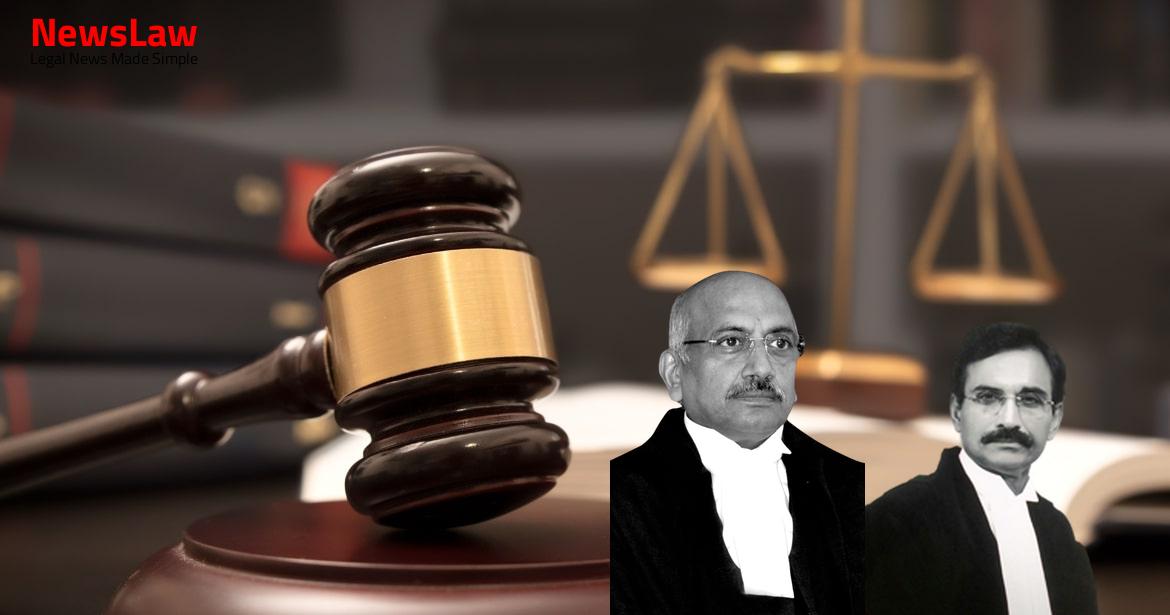In a significant ruling by the Supreme Court of India, the judgment addresses a land dispute and execution of a time-barred decree. The case involves the predecessor of the respondent, Raghuthaman, seeking redress for a property dispute. Stay informed about the legal intricacies surrounding property rights and decree execution in this landmark judgment.
Facts
- The High Court set aside the order dated 12.08.1997 passed in EA Nos.1 and 3 of 1995 and remanded the matter to the trial Court for fresh consideration.
- Judgment impugned herein does not call for any interference.
- Civil Appeals are preferred against the judgment and order dated 11.11.2011 passed by the High Court of Kerala at Ernakulam in E.F.A Nos.6 and 7 of 1998.
- High Court allowed the said appeals and remanded the matter to the trial Court for fresh consideration.
- Raghuthaman filed Execution First Appeals EFA Nos.6 and 7 of 1998 challenging the order in E.A. Nos.1 and 3 of 1995.
- EFA Nos.6 and 7 of 1998 were dismissed by the High Court on 30.05.2007.
- Raghuthaman then filed Execution Application No.1 of 1995 under Order XXI Rule 99 seeking re-delivery of the property.
- Notice was ordered to the judgment debtors who did not appear.
- Possession of a portion of the property was delivered to the plaintiff on 22.11.1994.
- Raghuthaman acquired shares in the property through a gift deed from Ayyappan’s children.
- The dispute was regarding item no.4 of the plaint schedule property in Sy.No.120/10.
- In the final decree, plaintiff was allotted one half portion of the property and Defendant No.10 was directed to pay equalization sum and mesne profits.
- Defendant No.1 executed a mortgage in favor of Nanu and later assigned the rights to Defendant No.10, who then assigned to Raghuthaman.
- EFA Nos.6 and 7 of 1998 were re-heard and eventually allowed by the High Court on 11.11.2011.
Also Read: Judgment in the Case of Section 302 IPC Conviction With Modified Sentence
Arguments
- The learned counsel argued that the decision in Chiranji Lal (D) by LRs. v. Hari Das (D) by LRs. is not applicable to the facts of the present case.
- It was contended that the predecessor of the respondents (Raghuthaman) did not establish his independent right, title, or interest in the property in question.
- The appellant’s counsel asserted that Raghuthaman being a pendente lite transferee cannot resist the execution of a decree filed by the original plaintiff or decree holder.
- Final decree passed on 09.03.1970, engrossed on stamp paper on 19.11.1990.
- Execution petition for possession filed on 13.03.1991, barred by limitation under Article 136 of Limitation Act.
- Predecessor of respondents entitled to raise question of limitation for time-barred decree execution under Order XXI Rule 99 CPC.
Analysis
- The Stamp Act is aimed at securing revenue for the State on specific instruments and is not meant to be used as a technicality by litigants.
- There is no specific time frame mandated by law for furnishing stamp paper or engrossing a decree in a partition suit.
- Engrossment of a final decree in a partition suit relates back to the date of the decree, not the date of engrossment.
- The Court is not obligated to direct parties to furnish stamp papers for engrossing a decree in a partition suit.
- The doctrine of lis pendens does not render all transfers during pending litigation void, but rather subordinates rights to those of parties in the ongoing case.
- Subsequent transferees have the right to defend their interests, especially where the transferor during the case may not protect their title.
- Order XXI Rule 99 allows third parties dispossessed of property by decree holders or purchasers to seek redress from the court.
- Impleadment of subsequent transferees should be liberally approached to protect their rights, as per established legal precedents.
- Failure to furnish stamp paper for a decree cannot suspend the running of the execution limitation period; parties cannot benefit from their own non-compliance.
- Courts should not nullify transactions like the Registration Sale Deed (RSD) solely due to their timing during litigation, especially when the deed is not inherently invalid.
- A decree in a suit for partition determines the rights of the parties in immovable properties and divides shares by metes and bounds.
- In Yeswant Deorao Deshmukh v. Walchand Ramchand Kothari [1950 SCR 852], it was highlighted that the decree holder has the power to pay the court fee on the amount found due then and there.
- Decrees in partition suits are capable of execution from the date they are passed, as stated in the above case.
- Limitation rules aim to prevent delays in seeking remedies and ensure prompt resolution of disputes.
- As per the decision in Yogesh Goyanka v. Govind [2024 SCC OnLine SC 1692], the limitation for executing a partition decree starts from the date of the final decree and not from the date it is engrossed on stamp paper.
- The proposition that period of limitation remains suspended till stamp paper is furnished and decree engrossed thereon was rejected.
- The High Court applied the ratio from the Chiranjilal case to the present case.
- High Court set aside the order passed in the Execution Petition and remanded the matter to the trial court for fresh consideration.
- All issues including independent right, title or interest claimed in the property to be adjudicated in the trial court.
- No infirmity or illegality found in the judgment of the High Court.
Decision
- Appellants have the option to raise all contentions before the trial Court.
- Costs made easy.
- Pending application(s) shall stand disposed of.
- Civil Appeals are dismissed.
Case Title: RENJIT K.G.. Vs. SHEEBA (2024 INSC 773)
Case Number: C.A. No.-008315-008316 – 2014



